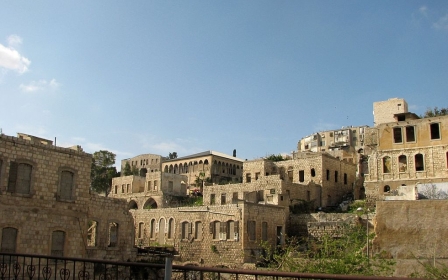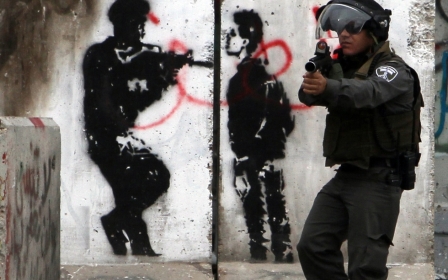'Just a few more apartments': Netanyahu dismisses concerns over Israeli settlements

Benjamin Netanyahu is a busy man; he certainly doesn’t have time to deal seriously with international objections – even from allies – to petty topics such as settlement expansion.
That was the impression Israel’s prime minister gave on Wednesday, when he dismissed US concerns about the recent approval of 800 new housing units in settlements. "A few more apartments near the municipality of Ma’ale Adumim" are not "preventing peace", Netanyahu said.
This was classic Bibi disingenuousness.
First, Israel’s settlements in the Occupied Palestinian Territory – every single one of them – are illegal. These colonies don’t somehow pass a threshold of legality when they reach a certain size; from the largest city-settlement to the smallest hill-top caravan, the settlements are illegal. Period.
Second, settlements form part of an inherently discriminatory regime. In other words, it’s not "just" a question of international law; Israel’s network of colonies has been established through land expropriation and violence, and has created two, "separate and unequal" population groups.
Third, settlements – including the so-called "blocs" – have transformed Occupied East Jerusalem and the West Bank into economically dependent, fragmented cantons. They restrict Palestinians’ ability to access natural resources, or to expand businesses and communities.
So no, the issue is not the addition of a balcony here, or a housing unit there; the point is that settlements fly in the face of the law, human rights, and the territorial contiguity of occupied lands.
That said, and for all the political games that go into settlement announcements, the steps taken in recent years by the Israeli state to colonise more Palestinian land are not insignificant.
In 2015, for example, some 62,000 dunums of land were "ratified" by the Israeli authorities as "state land", the largest such amount since 2005. Ratification is a necessary precursor to the allocation of land for settlement expansion, or for retroactively "legalising" unauthorised settler outposts.
In August 2014, Israel declared 1,000 acres in the Bethlehem region to be "state land", ready for settlement construction. Under Netanyahu, new construction in settlements located outside of the illegal Separation Wall has grown as a proportion of the total amount from 20 to 35 percent.
Thus for Israel to continue to build new houses in the settlements, to expand the settlements and oversee an ever-rising settler population, sends a clear message: the Israeli government has no respect for international law, and rejects the Palestinians’ basic rights.
As the UN secretary-general’s statement this week put it, settlement construction "raises legitimate questions about Israel’s long-term intention," concerns "which are compounded by continuing statements of some Israeli ministers calling for the annexation of the West Bank".
Indeed, this very week, Israeli Intelligence Minister Yisrael Katz urged the government to annex major illegal settlements Ma’ale Adumim, Givat Ze’ev, Beitar Illit and Gush Etzion. A bill proposing the annexation of Ma’ale Adumim will soon be introduced in the Knesset.
A US State Department spokesperson described the most recent announcement as "the latest step in what seems to be a systematic process of land seizures, settlement expansions, and legalisations of outposts that is fundamentally undermining the prospects for a two-state solution".
He also expressed the Obama administration’s concern with "the designation of land throughout the West Bank for exclusive Israeli use".
Slowly, the language of Western officials is starting to match what Palestinians, human rights groups and solidarity activists have been saying for decades. Unfortunately, the pace of change is not quick enough – and there is no indication of a political willingness to change policy to fit the analysis.
But it was a sign that even in Washington DC, no one is going to be buying Bibi’s "it’s just a few apartments" dismissal.
- Ben White is the author of Israeli Apartheid: A Beginner’s Guide and Palestinians in Israel: Segregation, Discrimination and Democracy. He is a writer for Middle East Monitor, and his articles have been published by Al Jazeera, al-Araby, Huffington Post, The Electronic Intifada, The Guardian’s Comment is free, and more.
The views expressed in this article belong to the author and do not necessarily reflect the editorial policy of Middle East Eye.
Photo: Israeli Prime Minister Benjamin Netanyahu delivers a speech in Jerusalem on 23 June, 2016 (AFP).
New MEE newsletter: Jerusalem Dispatch
Sign up to get the latest insights and analysis on Israel-Palestine, alongside Turkey Unpacked and other MEE newsletters
Middle East Eye delivers independent and unrivalled coverage and analysis of the Middle East, North Africa and beyond. To learn more about republishing this content and the associated fees, please fill out this form. More about MEE can be found here.





